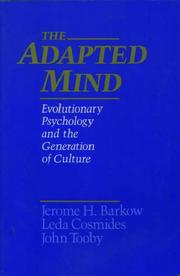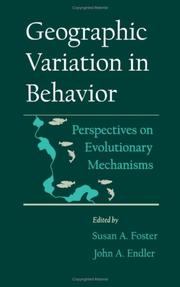| Listing 1 - 10 of 40 | << page >> |
Sort by
|
Book
ISBN: 1634852133 Year: 2016 Publisher: New York, New York : Nova Biomedical,
Abstract | Keywords | Export | Availability | Bookmark
 Loading...
Loading...Choose an application
- Reference Manager
- EndNote
- RefWorks (Direct export to RefWorks)
Behavior evolution. --- Human evolution. --- Human behavior. --- Anthropology.
Book
ISBN: 1351792237 1315204843 1351792245 9781315204840 9781351792233 9781351792240 9781351792226 1351792229 1138700290 9781138700291 Year: 2019 Publisher: London ; New York : Routledge, Taylor & Francis Group,
Abstract | Keywords | Export | Availability | Bookmark
 Loading...
Loading...Choose an application
- Reference Manager
- EndNote
- RefWorks (Direct export to RefWorks)
Cognition and culture. --- Human beings. --- Behavior evolution.

ISBN: 1280760826 9786610760824 0195356470 9780195356472 0195101073 0190282819 Year: 1992 Publisher: New York ; Oxford : Oxford University Press,
Abstract | Keywords | Export | Availability | Bookmark
 Loading...
Loading...Choose an application
- Reference Manager
- EndNote
- RefWorks (Direct export to RefWorks)
This collection of research essays is centred on the complex, evolved psychological mechanisms that generate human behaviour and culture. It aims to introduce the field of evolutionary psychology to a wider audience and to show how the field connects evolutionary biology to social behaviour.
Behavior evolution. --- Cognition and culture. --- Genetic psychology. --- Sociobiology.
Book
ISBN: 1281747610 9786613790132 0231521685 9780231521680 9780231150705 0231150709 9781281747617 Year: 2012 Publisher: New York : Columbia University Press,
Abstract | Keywords | Export | Availability | Bookmark
 Loading...
Loading...Choose an application
- Reference Manager
- EndNote
- RefWorks (Direct export to RefWorks)
Evolution and the Emergent Self is an eloquent and evocative new synthesis that explores how the human species emerged from the cosmic dust. Lucidly presenting ideas about the rise of complexity in our genetic, neuronal, ecological, and ultimately cosmological settings, the author takes readers on a provocative tour of modern science's quest to understand our place in nature and in our universe. Readers fascinated with "Big History" and drawn to examine big ideas will be challenged and enthralled by Raymond L. Neubauer's ambitious narrative.How did humans emerge from the cosmos and the pre-biotic Earth, and what mechanisms of biological, chemical, and physical sciences drove this increasingly complex process? Neubauer presents a view of nature that describes the rising complexity of life in terms of increasing information content, first in genes and then in brains. The evolution of the nervous system expanded the capacity of organisms to store information, making learning possible. In key chapters, the author portrays four species with high brain:body ratios-chimpanzees, elephants, ravens, and dolphins-showing how each species shares with humans the capacity for complex communication, elaborate social relationships, flexible behavior, tool use, and powers of abstraction. A large brain can have a hierarchical arrangement of circuits that facilitates higher levels of abstraction.Neubauer describes this constellation of qualities as an emergent self, arguing that self-awareness is nascent in several species besides humans and that potential human characteristics are embedded in the evolutionary process and have emerged repeatedly in a variety of lineages on our planet. He ultimately demonstrates that human culture is not a unique offshoot of a language-specialized primate, but an analogue of fundamental mechanisms that organisms have used since the beginning of life on Earth to gather and process information in order to buffer themselves from fluctuations in the environment.Neubauer also views these developments in a cosmic setting, detailing open thermodynamic systems that grow more complex as the energy flowing through them increases. Similar processes of increasing complexity can be found in the "self-organizing" structures of both living and nonliving forms. Recent evidence from astronomy indicates that planet formation may be nearly as frequent as star formation. Since life makes use of the elements commonly seeded into space by burning and expiring stars, it is reasonable to speculate that the evolution of life and intelligence that happened on our planet may be found across the universe.
Human evolution. --- Human behavior. --- Behavior evolution. --- Social evolution. --- Animal behavior --- Evolution (Biology) --- Evolution.
Book
ISBN: 0300224508 9780300224504 9780300208719 0300208715 Year: 2016 Publisher: New Haven, Connecticut : Yale University Press,
Abstract | Keywords | Export | Availability | Bookmark
 Loading...
Loading...Choose an application
- Reference Manager
- EndNote
- RefWorks (Direct export to RefWorks)
Are humans still subject to the forces of evolution? An evolutionary biologist provides surprising insights into the future of Homo sapiens In this intriguing book, evolutionary biologist Scott Solomon draws on the explosion of discoveries in recent years to examine the future evolution of our species. Combining knowledge of our past with current trends, Solomon offers convincing evidence that evolutionary forces still affect us today. But how will modernization-including longer lifespans, changing diets, global travel, and widespread use of medicine and contraceptives-affect our evolutionary future? Solomon presents an entertaining and accessible review of the latest research on human evolution in modern times, drawing on fields from genomics to medicine and the study of our microbiome. Surprising insights, on topics ranging from the rise of online dating and Cesarean sections to the spread of diseases such as HIV and Ebola, suggest that we are entering a new phase in human evolutionary history-one that makes the future less predictable and more interesting than ever before.
Behavior evolution. --- Human evolution. --- Human evolution --- Evolution (Biology) --- Forecasting. --- Evolution (Biologie) --- Homme --- Evolution
Book
ISBN: 9780195331929 9780195331936 0195331923 0195331931 0199715785 9780199715787 Year: 2010 Publisher: Oxford ; New York : Oxford University Press,
Abstract | Keywords | Export | Availability | Bookmark
 Loading...
Loading...Choose an application
- Reference Manager
- EndNote
- RefWorks (Direct export to RefWorks)
Evolutionary Behavioral Ecology is intended to be used as a text for graduate students and a sourcebook for professional scientists seeking an understanding of the evolutionary and ecological processes shaping behavior across a wide array of organisms and a diverse set of behaviors. Chapters are written by leading experts in the field, providing a core foundation, a history of conceptual developments, and fresh insight into the controversies and themes shaping the continuing development of the field. Essays on adaptation, selection, fitness, genetics, plasticity, and phylogeny as they pertain
Animal behavior --- Animal ecology --- Animaux --- Ecologie animale --- Evolution --- Moeurs et comportement --- Animal ecology. --- Animals --- Zoology --- Ecology --- Behavior evolution --- Evolution.
Book
ISBN: 1282346334 9786612346330 0199717818 9780199717811 9780195319842 0195319842 6612346337 9781282346338 0197734987 Year: 2009 Publisher: New York : Oxford University Press,
Abstract | Keywords | Export | Availability | Bookmark
 Loading...
Loading...Choose an application
- Reference Manager
- EndNote
- RefWorks (Direct export to RefWorks)
Cognition in animals. --- Animal behavior --- Animal ecology. --- Animals --- Zoology --- Ecology --- Behavior evolution --- Animal cognition --- Animal intelligence --- Evolution.
Book
ISBN: 1628943084 9781628943085 9781628943061 9781628943078 Year: 2017 Publisher: New York : Algora Publishing,
Abstract | Keywords | Export | Availability | Bookmark
 Loading...
Loading...Choose an application
- Reference Manager
- EndNote
- RefWorks (Direct export to RefWorks)
Human evolution --- Behavior evolution. --- Behavioral evolution --- Evolutionary psychology --- Evolution (Biology) --- Physical anthropology --- Human beings --- Social aspects. --- Origin

ISBN: 019756044X 1280526858 9786610526857 0195359488 142940423X 9781429404235 9781280526855 9780195082951 0195082958 Year: 1999 Publisher: New York : Oxford University Press,
Abstract | Keywords | Export | Availability | Bookmark
 Loading...
Loading...Choose an application
- Reference Manager
- EndNote
- RefWorks (Direct export to RefWorks)
'Geographic Variation in Behavior' explores the evolution of geographic variation in behaviour within species. The contributors have pioneered a variety of approaches to using geographically variable behavioural phenotypes for addressing evolutionary issues. They summarize advances in the field to date, evaluate the strengths and weaknesses of various approaches, and give a clear and balanced overview of this area.
Animal behavior --- Animals --- Animal ecology. --- Zoology --- Ecology --- Animal variation --- Variation (Biology) --- Behavior evolution --- Evolution. --- Variation. --- Variation --- Animal genetics. Animal evolution --- Animal ethology and ecology. Sociobiology --- Zoogeography

ISBN: 0691034931 9780691034935 0691167982 140084360X 9781400843602 9780691167985 Year: 1995 Publisher: Princeton, NJ : Princeton University Press,
Abstract | Keywords | Export | Availability | Bookmark
 Loading...
Loading...Choose an application
- Reference Manager
- EndNote
- RefWorks (Direct export to RefWorks)
The Neanderthals populated western Europe from nearly 250,000 to 30,000 years ago when they disappeared from the archaeological record. In turn, populations of anatomically modern humans, Homo sapiens, came to dominate the area. Seeking to understand the nature of this replacement, which has become a hotly debated issue, Paul Mellars brings together an unprecedented amount of information on the behavior of Neanderthals. His comprehensive overview ranges from the evidence of tool manufacture and related patterns of lithic technology, through the issues of subsistence and settlement patterns, to the more controversial evidence for social organization, cognition, and intelligence. Mellars argues that previous attempts to characterize Neanderthal behavior as either "modern" or "ape-like" are both overstatements. We can better comprehend the replacement of Neanderthals, he maintains, by concentrating on the social and demographic structure of Neanderthal populations and on their specific adaptations to the harsh ecological conditions of the last glaciation. Mellars's approach to these issues is grounded firmly in his archaeological evidence. He illustrates the implications of these findings by drawing from the methods of comparative socioecology, primate studies, and Pleistocene paleoecology. The book provides a detailed review of the climatic and environmental background to Neanderthal occupation in Europe, and of the currently topical issues of the behavioral and biological transition from Neanderthal to fully "modern" populations.
Behavior evolution --- Human evolution --- Neanderthals --- Paleolithic period --- Philosophy. --- Europe --- Antiquities. --- Homo mousteriensis --- Homo neanderthalensis --- Homo primogenicus --- Homo sapiens neanderthalensis --- Neandertalers --- Neandertals --- Neanderthal race --- Neanderthalers --- Behavioral evolution --- Fossil hominids --- Evolutionary psychology --- Evolution (Biology) --- Physical anthropology --- Human beings --- Origin --- Philosophy --- Antiquities --- Neanderthals - Europe. --- Human evolution - Europe - Philosophy. --- Behavior evolution - Europe.
| Listing 1 - 10 of 40 | << page >> |
Sort by
|

 Search
Search Feedback
Feedback About UniCat
About UniCat  Help
Help News
News